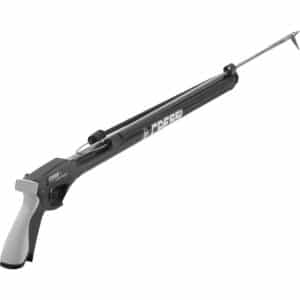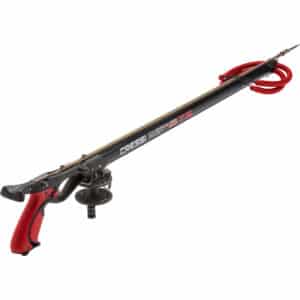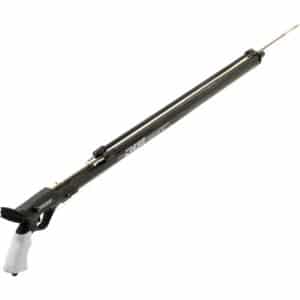Spearguns for Freediving
Level up your spearfishing with our curated selection of spearguns for freediving including compact reef guns to longer setups for clear-water range. Shop band-powered rail guns sized for your visibility and target species, with smooth tracking, crisp triggers, and clean rigging for quiet, accurate shots. Explore top freediving spearguns and build a setup that delivers range, control, and stealthvso more dives end with a hit.
NOTE: Prices here are ONLINE ONLY. In-Store pricing may differ.
How to Choose the Best Speargun for Freediving
Build a speargun setup that matches your freedive style and water conditions. Start with gun length (shorter for holes/low vis, mid-length for reefs, longer for clear water), then pick a band-powered rail gun or similar layout for quiet shots and simple upkeep. Balance tracking with range, choose a handle you control one-handed, and plan a clean rigging path (reel or float line) that won’t snag on descents. Shortlist a few options below and compare them side by side before adding the right shaft, bands, and line. Here are some popular options:
- Cressi Apache Speargun
- Cressi Comanche Rail Speargun
- Cressi Cherokee Fast Speargun
- Cressi Cherokee Power Speargun
- Cressi Victory Speargun
Freediving Speargun Buyer’s Guide
- Length & visibility: 70–80 cm tracks fast in holes/kelp. 90–100 cm is a versatile reef length. Longer guns help in clear water where fish hold distance.
- Bands & recoil: Start with a single strong band or twin lighter bands for smoother shots. Tune power to your shaft size and typical shot distance.
- Rail & accuracy: Rail-style barrels help guide the shaft and can steady aim. Pair with a crisp trigger and a comfortable, non-slip grip.
- Rigging: Decide between a reel (compact, great for reefs) or float line (buoy tracking, added safety in open water). Keep routing clean.
- Care & travel: Rinse gear, keep bands out of heat, and protect tips. For trips, consider lighter guns and breakdown-friendly accessories.
Quick Comparison
| Product | Key details | Best for | Notes |
|---|---|---|---|
| Cressi Apache Speargun | Compact, easy-to-handle entry gun with straightforward rigging. | Beginners, holes, low-vis reefs | Affordable way to start |
| Cressi Comanche Rail Speargun | Rail barrel and classic layout for balanced accuracy and tracking. | Versatile reef hunting | Popular all-rounder family |
| Cressi Cherokee Exo Speargun | Enhanced chassis with modern handle and sight line. | Intermediate progression | Upgradable band/shaft paths |
| Cressi Cherokee Fast Speargun | Streamlined build for quick target acquisition. | Active reef stalking | Smooth, responsive feel |
| Cressi Cherokee Power Speargun | More punch within the Cherokee family for longer shots. | Clear-water reef edges | Consider reel or float line |
| Cressi Victory Speargun | Refined trigger/ergonomics and a confidence-inspiring barrel. | Experienced freedivers | Premium feel and control |
Frequently Asked Questions (FAQs)
What speargun length is best for freediving reefs?
A 90–100 cm band gun balances range and tracking for typical reef visibility. If you mostly shoot in tight structure or low vis, a 70–80 cm is easier to maneuver. In clear water, step longer for stand-off shots.
Should I start with one band or multiple bands?
One quality band is simpler and forgiving. As you progress, two lighter bands can smooth the shot cycle and extend range without harsh recoil. Match band power to shaft diameter and the fish you target.
What’s Better – Reel vs float line for freediving?
Reels are compact and great for reefs with moderate fish size. Float lines add visibility and recovery in open water and help manage stronger fish. Many divers own both and switch based on the day’s plan.
Do rail barrels really improve accuracy?
Rails help guide the shaft and can steady your aim, especially with consistent band alignment. Accuracy still depends on smooth triggers, straight shafts, and clean rigging that won’t tug off-axis.
What upgrades make the biggest difference first?
Dialed-in bands (fresh, correctly cut), a straight, well-pointed shaft, and tidy line routing often improve results more than chasing maximum power. Add a reel or float line to match your terrain.



